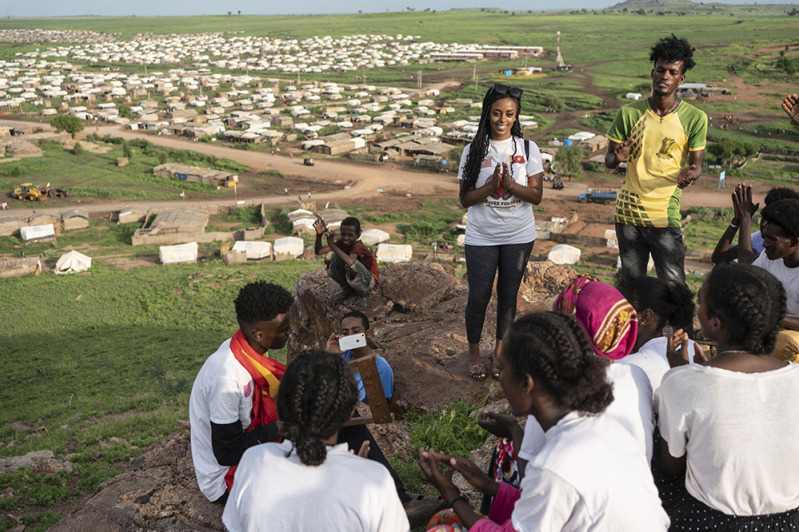
A wave of political coups and a resurgence of Islamic terror groups in what is known as the Sahel region in Africa led to a marked increase in persecution of Christians. Despite threats, imprisonment, and displacement, however, Christians are holding on to their faith and the gospel is spreading.
A report by the United States Commission on International Religious Freedom has raised concerns about the deteriorating rights to religious freedom and belief in the Sahel region. The Commission has blamed the rise of violent extremist groups and weak governance structures that have led to the persecution of religious minorities, mostly Christians.
The Sahel region consists of 10 countries spanning from Eritrea and Sudan in East Africa to Senegal and Mauritania in the West. Others include Nigeria, Niger, Chad, The Gambia, Mali and Burkina Faso.
“Violent insurgent groups such as the Islamic State Sahel Province (IS Sahel) and Katiba Macina perpetrate serious violations against religious minorities, often in the context of weak state security,” notes Michael Ardovino, a Policy Analyst with the Commission.
At least five of the ten countries in the region have experienced leadership disruptions in the form of military coups in recent years. Open Doors, a Christian advocacy organization that tracks and researches Christian persecution, ranks three Sahel countries – Sudan, Eritrea and Nigeria – among the top ten countries where Christians face the highest persecution.
Sudan – refugees coming to faith
In Sudan, the conflict between government forces and the paramilitary Rapid Support Forces (RSF) ended a fragile transitional government that was to usher in a civilian government. This was after the 2019 coup that ended President Omar al-Bashir 26-year rule. While there were signs of increasing religious freedom during the transitional government, sporadic attacks on Christians continued. Such instances included the arrest of Pastor Abdulla Suleiman of the Sudan Presbyterian Evangelical Church, and the attack of an Evangelical Lutheran pastor during a church service in Gezira state, among others.
The war has claimed over 10,000 lives and led to the displacement of some 7.6 million people. It has also seen the occupation and destruction of churches including a Coptic Monastery in Gezira and the Sudan Presbyterian Evangelical Church in Omdurman State, which was bombed in November.
Yet amidst deteriorating security and humanitarian conditions in Sudan, evangelism and conversions are being witnessed in some of the refugee camps such as the Wedwiel Refugee Camp that borders Sudan and South Sudan. According to reports, about 2,000 internally displaced people have converted from Islam to Christianity due to the outreach initiatives in some of the camps.
Sudan’s Christian population is a minority and constitutes less than 6 percent of the country’s 45 million population. The refugee camps, however, have provided not just shelter from the conflict but also psycho-social support and an opportunity for Christians to share the gospel with one of the unreached people groups in the region.
Mission Network News reported a missionary working in the refugee camps testifying that “refugees from Sudan, who come from tribes that have no believers or only a handful of believers, have seen up to 40 people come to Christ in one week…This is groundbreaking in evangelism amongst Sudanese Muslims.”
Eritrea – meeting in home churches
In neighbouring Eritrea, about 1,000 Christians have been imprisoned without being charged simply due to their faith in Jesus, according to Open Doors. Converts from Islam are particularly targeted by the authorities. Many have lost their jobs and been separated from their families while others have paid the ultimate price with their lives for refusing to renounce Jesus despite threats, abuse, imprisonment, and torture.
The government only recognizes three Christian denominations; Lutheran, Catholic and Orthodox. Protestant and evangelical churches were shut down in 2002 and hundreds of pastors and their congregants detained without trial. According to a July 2023 op-ed by Todd Nettleton of Voice of the Martyrs, two pastors had already spent 7,000 days in prison. Yet the persecution of Christians in Eritrea, a country where the population between the two religions is evenly split, has not dampened the resolve of evangelical and Pentecostal communities who meet in home churches.
Nigeria – hope and resilience in hostile conditions
Persecution of Christians in Africa’s biggest country by population, Nigeria, has accelerated over the recent past, fuelled by the growth of religious extremist groups especially in the North. In four months to January 2024, 100 Christians have been killed and others kidnapped by terrorists.
The threat to Christians is not just coming from terror groups but also from emerging blasphemy and Sharia laws that have led to the death by mob justice of people accused of blasphemy against Islam and the Prophet Mohammed.
Speaking during the US Foreign Affairs sub-committee hearing on the Future of Freedom in Nigeria on 14 February, Bishop Wilfred Anagbe told the committee members that the attacks on Christians in many parts of Nigeria are “systematic, organized and brutal,” mainly perpetrated by the militant Fulani terrorists.
“Between 2021 and 2023, over 100 priests and sisters were kidnapped; some have never returned despite the high ransom we paid for their release,” said Bishop Anagbe.
Despite the worsening conditions in the region, there have been embers of hope and resilience of persecuted Christians and the resolve of pastors to continue preaching the gospel and of new converts confessing Jesus as Lord in extremely hostile conditions.
“Nothing comes to us without the will of God. Through persecution – I don’t know why, but the church grows,” said a pastor in Eritrea.






